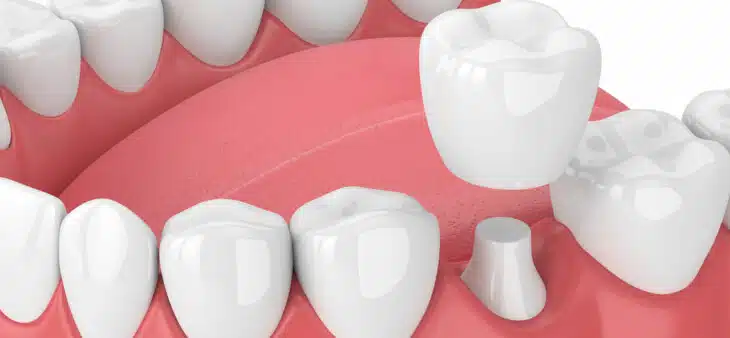
According to the National Dental Practice-Based Research Network, 3.8% of dental crowns need to be remade. This study found that among individual practices, 58% had no issues with dental crowns. Years of practice significantly impacted the success rate of a dental crown, with the majority of the 58% having multiple years of practice.
Dental crowns are a common treatment for damaged or decayed teeth. They are designed to protect and restore the function of the affected tooth. However, a dental crown can cause a toothache for various reasons, such as improper placement, ill-fitting crowns, or underlying dental issues.
1. Tooth Decay Under the Dental Crown
The crown can act as a barrier, making it difficult for your dentist to detect decay in the underlying tooth. If the tooth was not properly cleaned or treated before the crown was placed, decay can continue to progress even after the crown is in place.
Symptoms of decay under a crown may include sensitivity, pain when biting or chewing, or a foul taste or smell in the mouth. If left untreated, decay under a crown can lead to further damage to the tooth, including abscesses or loss of the tooth. Treatment for decay under a crown typically involves removing the crown, cleaning and treating the decay and then placing a new crown.
2. Teeth Grinding
Constant grinding can wear down the crown and the tooth underneath, causing sensitivity, pain, and even cracking or breaking the restoration. Teeth grinding can also cause the crown to become loose, leading to further discomfort and pain.
Teeth grinding can be caused by various factors, including stress, anxiety, sleep disorders, and certain medications. If teeth grinding is the suspected cause of the toothache, your dentist may recommend using a night guard to protect the tooth and crown while sleeping.
3. A Cracked or Loose Dental Crown
A cracked crown can cause pain, sensitivity, and even infection in the tooth underneath. A loose crown can cause discomfort, pain, and even shifting of the tooth. A crown that is not securely in place can also allow bacteria to enter the space between the tooth and crown, leading to further decay and infection.
4. Recessed Gums
Recessed gums occur when the gum tissue surrounding the tooth pulls back, exposing more of the tooth and the crown. This can cause sensitivity and pain in the tooth, especially when eating or drinking hot or cold foods. Recessed gums can also make the tooth and crown more susceptible to decay and infection.
5. Improper Fit
A crown that is too tight may cause pressure and pain in the tooth and surrounding gums, while a crown that is too loose can allow bacteria to enter and cause decay and infection. If the crown is not the right shape or size, it can cause discomfort and pain when biting or chewing.
An improper fit can happen for various reasons, such as the crown being made with inaccurate measurement or the shape of the tooth changing after the crown was placed.
When to See a Dentist
If you are experiencing a toothache after receiving a dental crown, it’s essential to see a dentist as soon as possible to determine the cause of the pain and to receive appropriate treatment.
If you suspect your dental crown is causing a toothache, we recommend you schedule an appointment with us as soon as possible. Our experienced dental team can examine your tooth, take an X-ray, and recommend the appropriate treatment to alleviate your pain and protect your dental health.
Don’t let a toothache caused by a dental crown go untreated. Call us today to schedule an appointment.
